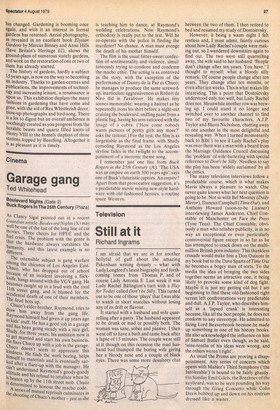Still at it
Richard ngrams
I am afraid that we are in for another bellyful of guff about the amazing Pakenham writing dynasty — what with Lady Longford's latest biography and forthcoming tomes from Thomas P. and of course Lady Antonia F. Last week it was Lady Rachel Billington's turn with a Play for Today called Don't be Silly. This turned out to be one of those 'plays' that I was able to watch in short snatches without losing any of its drift or flavour.
It started with a husband and wife quarrelling after a party. The husband appeared to be drunk or mad or possibly both. The woman was sane, sober and passive. I then went off to have a bath and came back after a lapse of 15 minutes. The couple were still at it though on this occasion the mad husband had thumped the boring wife giving her a bloody nose and a couple of black eyes. There was some more desultory chat between the two of them. I then retired to bed and resumed my study of Dostoievsky.
However, it being a warm night I felt restless and, I must admit, faintly curious about how Lady Rachel's couple were making out, so I wandered downstairs again to find out. The two were still quarrelling away, the wife said to her husband: 'People don't change after ten years. You have.' I thought to myself: what a bloody silly remark. Of course people change after ten years. They change after ten months, or even after ten weeks. This is what makes life interesting. This a point that Dostoievsky understood only too well, but Lady Rachel does not. Meanwhile another row was brewing up. I could stand it no longer and switched over to another channel to find two of my favourite characters, A.J.P. Taylor and Mavis Nicholson, chatting away to one another in the most delightful and revealing way. When I turned momentarily back to BBC1 to see if Lady Rachel's play was over there was a man with a beard from the Marriage Guidance Council discussing the 'problem' of wife-battering with special reference to Don't be Silly. Needless to say the play has been 'widely acclaimed' by all the critics.
The many television interviews follow a predictable course, which is what makes Mavis always a pleasure to watch. One never quite knows what her next question is going to be. Not so with Bel Mooney (Daily Mirror), Duncan Campbell (Time Out), and Anthony Howard (soon-to-be Listener) interviewing James Anderton, Chief Con stable of Manchester on Face the Press (Tyne Tees). The Chief Constable, obviously a man who relishes publicity, is in no way an exceptional or even particularly controversial figure except in so far as he has attempted to crack down on the multi million British porn industry. This thankless crusade would make him a Don Quixote in my book but to the Dave Sparts of Time Out he becomes a bogey man of sorts. To the media the idea of bringing the two sides together seems an attractive one, it being likely to provoke some kind of dog fight. Maybe it is just my getting old but I am beginning to find these old-fashioned right versus left confrontations very predictable and dull. A.J.P. Taylor, who describes himself as a 'lapsed crank' is interesting because, like all the best people, he does not conform to any stereotype. He admitted to liking Lord Beaverbrook because he made up something in one of his history books. He also acknowledged the influence on him of Samuel Butler even though, as he said, 'nine-tenths of his ideas were wrong, and the others weren't right'.
As usual the Proms are proving a disappointment. Any series of concerts which opens with Mahler's Third Symphony (`the Intolerable') is bound to be fairly ghastly. On Sunday Emil Gilds, the Brezhnev of the keyboard, was to be seen pounding his way through the Grieg Concerto while Colin Davis bobbed up and down on his rostrum dressed like a waiter.


































 Previous page
Previous page